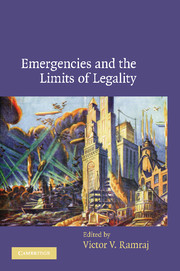Book contents
- Frontmatter
- Contents
- List of contributors
- Preface
- Introduction
- PART ONE Legality and extra-legality
- PART TWO Conceptual and normative theories
- PART THREE Political and sociological theories
- PART FOUR Prospective constraints on state power
- PART FIVE Judicial responses to official disobedience
- 12 Necessity, torture and the rule of law
- 13 Deny everything: intelligence activities and the rule of law in times of crisis
- PART SIX Post-colonial and international perspectives
- Index
- References
13 - Deny everything: intelligence activities and the rule of law in times of crisis
Published online by Cambridge University Press: 10 August 2009
- Frontmatter
- Contents
- List of contributors
- Preface
- Introduction
- PART ONE Legality and extra-legality
- PART TWO Conceptual and normative theories
- PART THREE Political and sociological theories
- PART FOUR Prospective constraints on state power
- PART FIVE Judicial responses to official disobedience
- 12 Necessity, torture and the rule of law
- 13 Deny everything: intelligence activities and the rule of law in times of crisis
- PART SIX Post-colonial and international perspectives
- Index
- References
Summary
In the opening scene of The History Boys, Alan Bennett's recent play about education and childhood, a schoolteacher who has become a celebrity through populist iconoclasm advises a group of elected officials on the best way to sell a distasteful piece of legislation curtailing civil liberties to a sceptical electorate: ‘I would try not to be shrill or earnest. An amused tolerance always comes over best, particularly on television. Paradox works well and mists up the windows, which is handy. “The loss of liberty is the price we pay for freedom” type thing’.
Debates about the appropriate legal response to emergency frequently invoke paradox, with Carl Schmitt at the perilous extreme arguing that the exercise of sovereign power reveals a foundational problem in legal liberalism itself. For the purposes of this volume, the debate is framed as a call for pragmatic recognition that, in extremis, public officials may be required to act outside the law and that after-the-fact ratification recognises this and limits the possibility of abuse; on the opposing side, the response is that the embrace of ‘extra-legal measures’ misconceives the rule of law, underestimates the capacity of constitutional orders to deal with crisis and overestimates the ability and willingness of skittish publics to reign in officials. The two positions thus caricatured are identified in this volume with the work of Oren Gross and David Dyzenhaus, though the debate is, of course, far older than these agonists of post-9/11 constitutionalism.
- Type
- Chapter
- Information
- Emergencies and the Limits of Legality , pp. 314 - 334Publisher: Cambridge University PressPrint publication year: 2008
References
- 3
- Cited by



